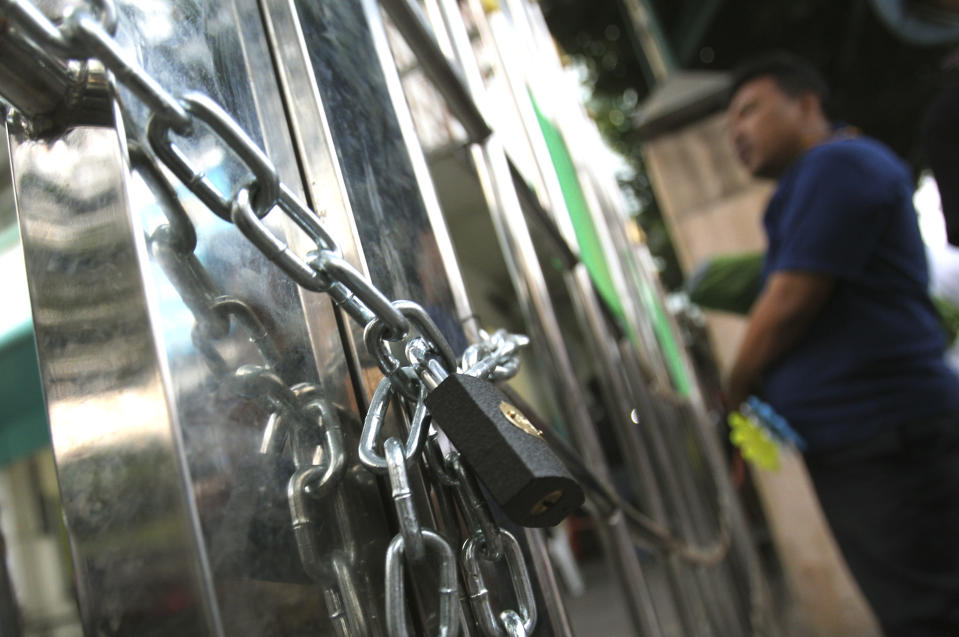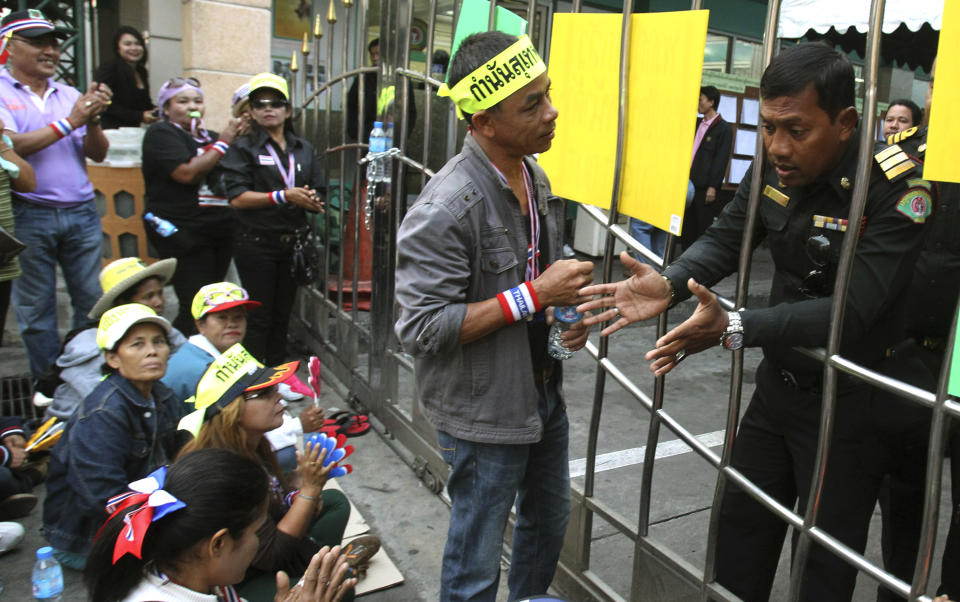Thai protesters block polling stations in Bangkok
BANGKOK (AP) — Anti-government demonstrators trying to derail a contentious general election scheduled next week in Thailand swarmed dozens of polling stations Sunday, chaining doors and gates shut and blocking hundreds of thousands of voters from casting advance ballots in the latest blow to the country's increasingly embattled government.
The chaos underscored the increasing powerlessness of Prime Minister Yingluck's administration, which had called the Feb. 2 vote in a failed bid to ease months of street protests that have thrown the nation into crisis. Police took no action to disperse the crowds, following longstanding government orders that appear aimed at efforts to avoid triggering a military coup.
Although disruptions were expected in Bangkok and the opposition stronghold in southern Thailand, voting Sunday was likely to go ahead unhindered in the majority of the country. About 49 million of the nation's 64 million people are eligible to cast ballots, and 2.16 million applied for advance voting.
The outcome of Sunday's balloting is seen as a harbinger for the main poll, which both the Election Commission and demonstrators want postponed. Ruling party officials suggested over the weekend that they were willing to delay the ballot — but only if protests end and the main opposition party abandons its boycott. There has been no sign yet that Yingluck's rivals would agree to any deal, however.
In Bangkok on Sunday, swarms of protesters waving the Thai flag blocked electoral officials, ballot boxes and voters from getting inside polling centers, and electoral officials closed 34 of them as a result. In the south, 11 voting stations were also forced to shut, bringing the total number closed to 45 out of 152 nationwide, electoral officials said.
The protest movement, known as the People's Democratic Reform Committee, said it was not obstructing the poll in a statement on its Facebook page. The group reiterated comments late Saturday by its leader, former lawmaker Suthep Thaugsuban, that "supporters are simply protesting the advance polls held today by surrounding/standing in front of election units."
Protest spokesman Akanat Promphan told The Associated Press that those who had locked the gates of polling stations had "acted on their own." But he did not condemn them and said only that any decision to close stations was made by Election Commission officials.
The protesters are pushing for Yingluck's government to be replaced by a non-elected 'people's council' that would implement anti-corruption reforms before a new vote can take place. They accuse Yingluck's government of carrying on the practices of her billionaire brother Thaksin Shinawatra, a former prime minister they allege used the family fortune and state funds to influence voters and subvert democracy.
Thaksin was ousted in a military coup in 2006 after street protests accusing him of corruption and abuse of power. The coup triggered a sometimes-violent and still active struggle for power between Thaksin's supporters and opponents. He fled into exile in 2008 to avoid a two-year prison sentence for a conflict of interest.
Even before Sunday's advance voting, there had been increasing doubt that the Feb. 2 poll would go ahead.
The Election Commission has argued the poll should be delayed because of concern over possible violence. But critics accuse the commission, which is supposed to be a neutral body, of bias. The commission pointedly failed to condemn an effort by protesters to disrupt candidate registration in December, and its chief has posed for at least one smiling photo with demonstrators.
Analysts say the courts and the country's independent oversight agencies all tilt heavily against the Shinawatras' political machine. Yingluck is facing several cases that could end with her or her party being banished from governing because of alleged corruption or violations of the constitution.
On Friday, the Constitutional Court ruled that the government, in agreement with the Election Commission, could postpone the Feb. 2 poll. But Yingluck's Pheu Thai party, which had argued it has no authority to delay balloting, questioned the legal basis for the ruling.
Even if the full vote goes ahead, Thailand's crisis is expected to drag on. Parliament is unlikely to achieve the quorum it needs to convene, which would prevent a new government from being formed.





